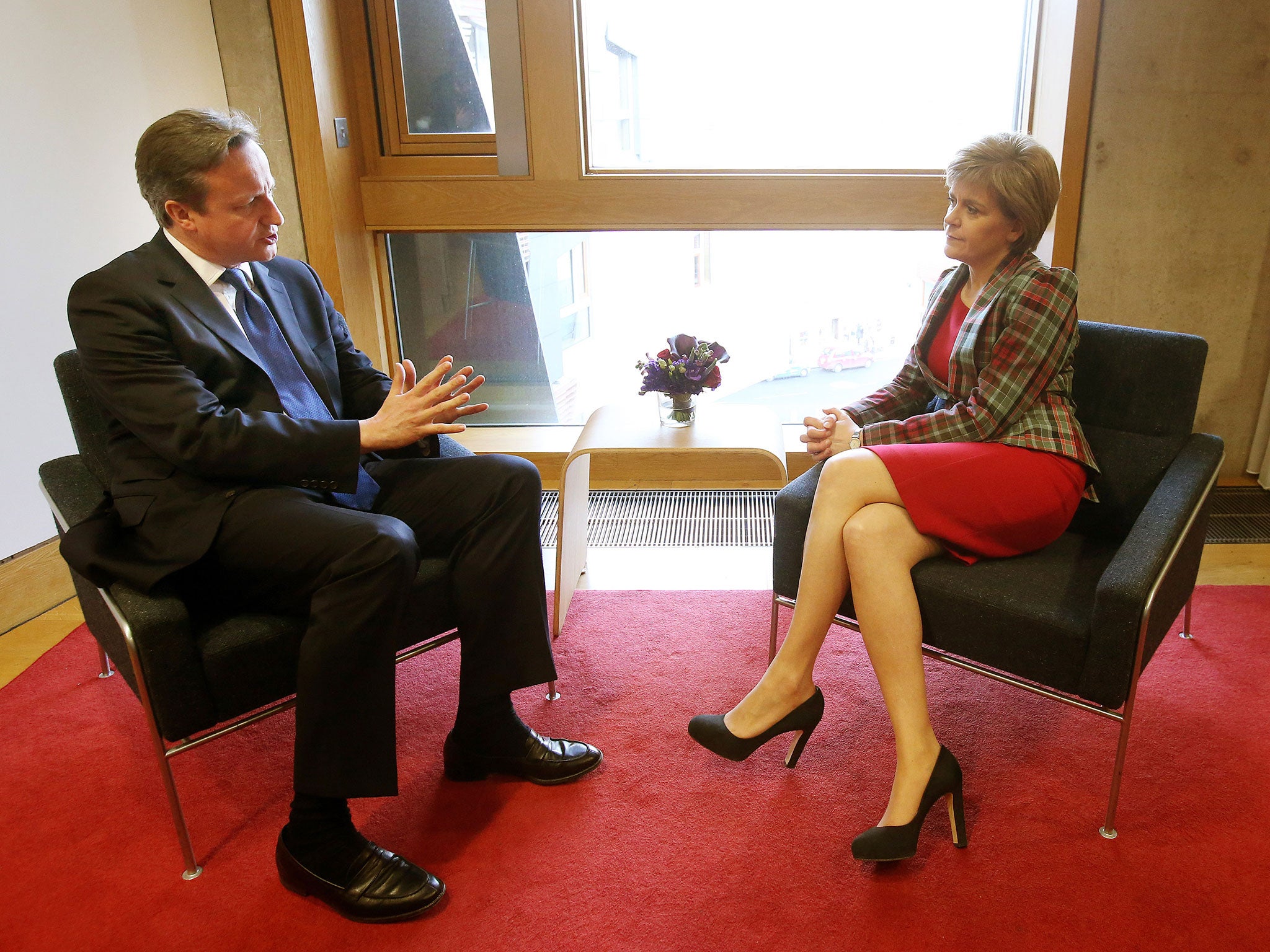Q&A: Edinburgh talks - what are the issues at stake when David Cameron and Nicola Sturgeon meet?

Q. During last year’s referendum, there was a late “vow” to deliver “extensive” new powers for Scotland. Three months on, the Smith Commission published recommendations on tax, welfare, elections and the rest. Wasn’t that a done deal?
A. Apparently not. Members of the Holyrood Parliament’s devolution committee have reopened combat on what Scotland was promised, and what they think Westminster is prepared to give. They claim – repeatedly, in the latest 170-page report – that “the spirit or the substance” of the Smith deal has not been met.
Q. The SNP’s winning of 56 of Scotland’s 59 Westminster seats last week, combined with their majority control of Holyrood, has turned Caledonia into something resembling a one-party state. Isn’t it understandable that Scotland is flexing its newfound muscle?
A. This report by MSPs was written before the election, so it’s not a reaction to Labour’s wipe-out. A fight-plan was well advanced. Despite all-party agreement on Lord Smith’s report – which proposed to add taxation, increased borrowing powers, new welfare responsibilities and air passenger duty to the “reserved” powers already given to Holyrood in 1999 (eg, education, environment, health, farming and fisheries) – this report can be summarised in three words: “We want more.”
Q. So has Westminster misread Scotland again? Has there been a wilful intent to row back from a promise?
A. That depends on your perspective, and on which side of the border you are. The Smith Commission intended to create an “enduring settlement” between Scotland and the rest of the UK. The whole “vow” exercise was fast-tracked, with legislation promised by 2015. But having taken part in that process, Holyrood now asserts that the “letter and spirit” of Smith have failed to be translated into the proposals put forward by the UK government. There is limited praise for some of Whitehall’s drafting skills, but when the new Scotland Bill is finally published, Holyrood wants everything spelled out in crystal clear terms.
Q. Does Holyrood not trust the UK Government?
A. The MSPs try hard to be mannered and respectful, but the bottom line is that there is more trust between a second-hand car salesman and a blind man than there currently is between Edinburgh and London. The Scots don’t trust Westminster to recognise the permanence of the Scottish Parliament, nor how new tax powers will be implemented; they question how robust are the promises that Scotland will not be adversely affected by any fiscal changes; and even on borrowing powers they accuse the UK government of being “silent” on how the new regime will operate.
Q. Isn’t this just a fight over “words”?
A. Yes; but the words are crucial ones. The MSPs want “may” in some clauses to be replaced by “shall”, implying that they believe Westminster isn’t being entirely honest on how permanent it expects all of this to be.
Q. Supposing they can sort this, will the fighting then stop, allowing us all to be pals again?
A. Sorry to disappoint, but this is just another battle in an on-going war that the SNP believe will end only with independence. Alex Salmond last week called the election result “a staging post” on Scotland’s route to sovereignty. This is a fight over a compromise halfway house.
Q. What happens after the Scotland Bill becomes law?
A. Nicola Sturgeon will take a beefed-up Smith for now, but will demand that negotiations begin immediately on what more needs to be handed over in the next two or three years. Her deputy, Stewart Hosie, has already said the SNP wants all taxes, including all business taxes, full responsibility for welfare, minimum wage, employment levers, and more. Downing Street mightconcede this, with much fanfare. But in return the power of Scottish MPs in the Commons will be severely watered down, and Westminster will cease to be a UK parliament. The so-called “English-votes-for-English-laws” is a another way of describing a federal UK.
Q. Hold on – the end of the UK? 1.6 million Scots voted Yes in the referendum, 2 million voted No, and just 1.4 million voted SNP on 7 May. What has changed?
A. Scotland. it would appear. In 1995, the then shadow Scottish Secretary, George Robertson, said what Tony Blair believed: “Devolution will kill nationalism stone dead.” That wasn’t true then, and makes less sense now. As the former Labour MP Tam Dalyell rightly forecast, “Devolution is a motorway to independence” and the exit routes are fast running out.
Join our commenting forum
Join thought-provoking conversations, follow other Independent readers and see their replies
Comments
Bookmark popover
Removed from bookmarks